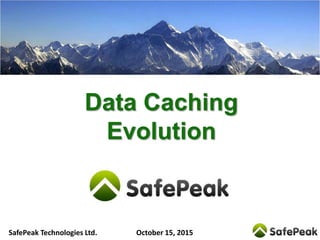Data Caching Evolution - the SafePeak deck from webcast 2014-04-24
- 1. October 15, 2015 Data Caching Evolution SafePeak Technologies Ltd.
- 2. 2 Data Caching is a key component for high performance and scalability application-database architecture Reasons for application caching: • Improve response times: reducing read data latency – results are already in-memory cache • Offload the “read load” from database servers (CPU & I/O) • Improve overall system scalability and operational efficiency Reasons for Data Caching
- 3. 3 Evolution of Data Caching DYI Local Caching DYI Distributed Caching: Key-Value (KV) DYI Data Grids: Distributed KV + Complex computing AUTOMATED DYNAMIC CACHING: Automated performance with full data coherency
- 4. 4 Sorting-out the DIY Distributed Products KV Caches Data Grids Memcached Oracle Coherence NCache GemFire / SqlFire (EMC) MSFT AppFabric GigaSpaces XAP Ehcache (java oriented) GridGain ElastiCache (Amazon Memcached) Hazelcast … Inifinispan … …
- 5. 5 1. A big based hash table: • A key/value store, living entirely in RAM on multiple servers • Accessed from any server as if the item is in the local RAM 2. Keys and values are arbitrary binary (serializable) entities: query record-sets, file-blobs, application variables 3. Basic operations are put(K,V), get(K,V), replace(K,V), remove(K) 4. Non-transactional, not a database, no interface with real database 5. Cache is Stale – requires an effort to mimic database to cover changes 6. Development oriented (no automation), medium to long dev project DIY Distributed Caching
- 6. 6 DIY Distributed Caching (Memcached example) # perl example my $memclient = Cache::Memcached->new({ servers => [ '10.0.0.10:11211', '10.0.0.11:11211' ]}); 3. Wrapping an SQL Query 2. Init a Memcached Client with a list of your pre-configured Memcached servers: 1. Install Memcached Service on servers (or even PCs) # Define a query and use it as a key for the Memcached: sql = "SELECT * FROM user WHERE user_id = ?" key = 'SQL:' . user_id . ':' . md5sum(sql) # We check if the value is 'defined' (or in cache), since '0' or 'FALSE' can be legitimate values! if (defined result = memcli:get(key)) { return result } else { # Query not in Cache, Get resultset from database server and convert to array handler = run_sql(sql, user_id) rows_array = handler:turn_into_an_array # Cache it for five minutes memcli:set(key, rows_array, 5 * 60) return rows_array } 4. Delete from cache sql = "SELECT * FROM user WHERE user_id = ?“ key = 'SQL:' . user_id . ':' . md5sum(sql) memcli:delete(key)
- 7. 7 DIY Data Grids: Distributed In-Memory Computing and Data Management * GridGain chart example In-Memory Data Grids (IMDG): Manage data in distributed memory and perform complex in-memory computing tasks.
- 8. 8 1. Reliable In-Memory data storage, live data, and jobs executions with balancing among grid nodes. Implements: Implements KV cache interface + Has indexed search by values Reliable distributed locks interface Events Processing => data change notifications and management Advanced use-cases: Messaging, Map-Reduce calculations, Cluster-wide singleton, more … 2. Very high read-write performance 3. Development oriented (no automation), a long dev project DIY Data Grids: Caching Concepts
- 9. 9 Automated Dynamic Caching 1. Application agnostic – Supports Custom and 3rd-party applications 2. Caching of any read-based queries and stored procedures 3. Never stale cache. Writes trigger: Real-time eviction/invalidation of the right cache items Real-time database synchronization 4. Efficient cache management Keeps “hot-data” in memory
- 10. 10 Automated Dynamic Caching Results of queries return in microseconds (Avg: 100µsec = 0.000100sec). Ensures data delivery and high availability for SQL Server applications. Safeguards against unpredictable traffic spikes and usage surges.
- 11. 11 1. Caching concept: Combination of cache and in-memory database – Smart caching of Hot-data Results with real-time eviction on DMLs 2. Minimal configuration and management. Self-learning and self-adaptive: • DB Schema – objects definition and dependencies map between objects • Recognizes SQL patterns and their tables/views dependencies, that are automatically activated for caching and real-time cache eviction • Self-adaptive to schema and application changes 3. 100% ACID, 100% data integrity, 100% up-to-date database 4. Fast: µs access to in-memory hot data: x10-x1000 faster 5. Safe: embedded failover proxy & optional cluster deployment SafePeak Software for SQL Server apps: Automated Dynamic Caching
- 12. Results: Large Mobile Telecom Customer E-Commerce Application 12 Aberdeen Group Research: E-commerce response time acceleration effect: From 6 to 5 sec.: Sales Conversions Customer Satisfaction Page Views 12.5%7.5% 19% 9X Faster DB
- 13. Case Study: Tier 1 SW Vendor SharePoint Application SQL Server CPU Time (% ) 13 • 1/10 CPU Load • 1/10 I/O Load • No more overload CPU Overload • Cache hit = 75% • Acceleration: 70% - 350% Application Time (Sec)
- 14. 14 Real Time Performance Analysis & Control Intuitive browser- base Interface Manage Cache on Database, Table and Query Level Automated SQL Patterns Detection and Analysis Real-time & statistical Business Info on production queries Production Deployment in just HOURS DB speed=98ms Cache speed=0.15ms New Average=3.8ms
- 15. 15 Better, Faster, Cost-Effective SAFEPEAK: Dynamic Caching Yes Hours Yes None Low App coding Caching and DB Tuning No Months No •Dev + DBA Time •3rd party apps limitations High Hardware Scale-Up No Weeks Yes •Hardware •SW Licenses •IT+DBA Time High Virtualization Optimized Deployment Time Application Agnostic Hidden High Cost Factors Cost “SafePeak’s unique plug and play, automated solution, provides customers an immediate improvement of application performance and response time. A key differentiator vis-à-vis existing solutions.” Massimo Pezzini, VP & Fellow - Gartner
- 17. Accelerate Your Business. THANK YOU Vladi Vexler, CTO vladi@safepeak.com www.safepeak.com 17
Editor's Notes
- “Daynamic” Giga (not jiga)
- Un needed extra slide.
- Upper chart Lower chart
- Explain columns, explain x60 faster (for first query)

